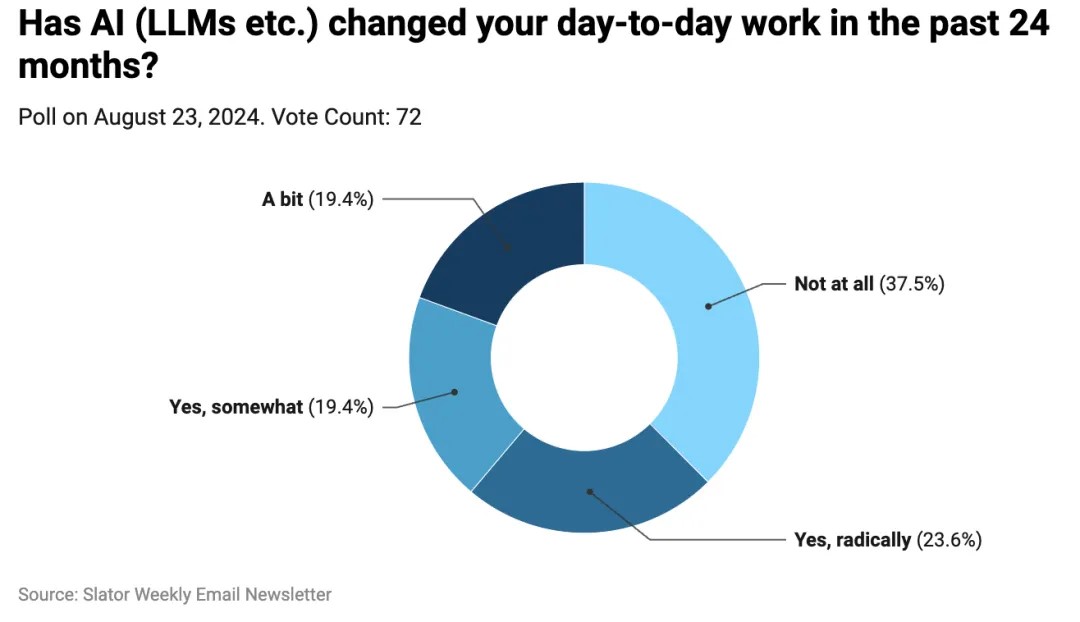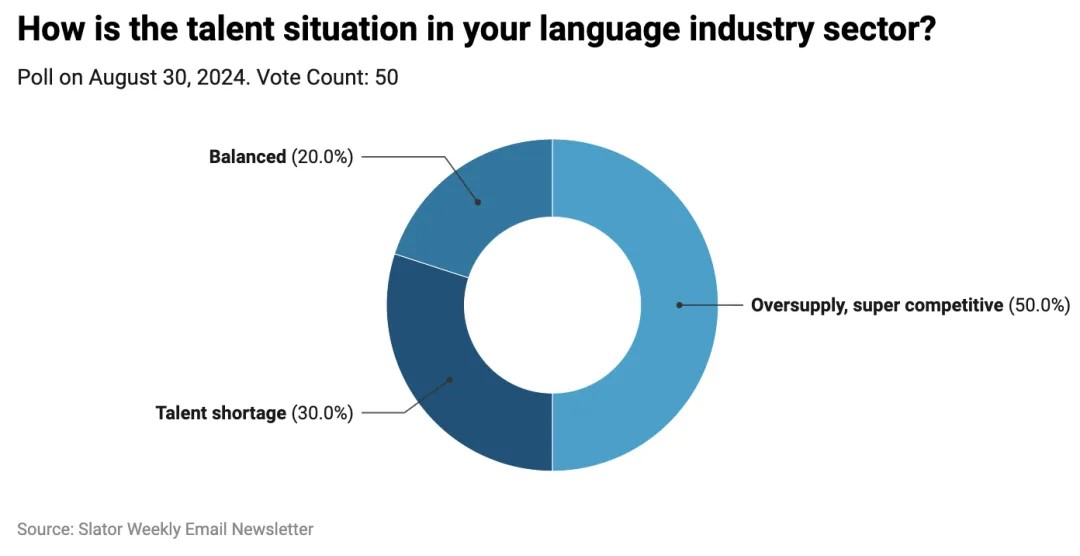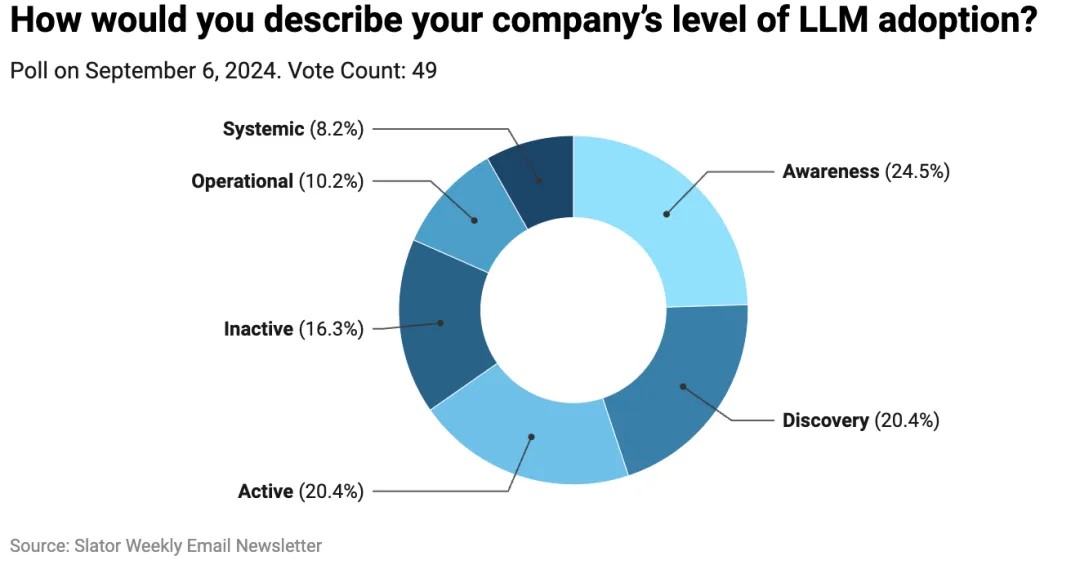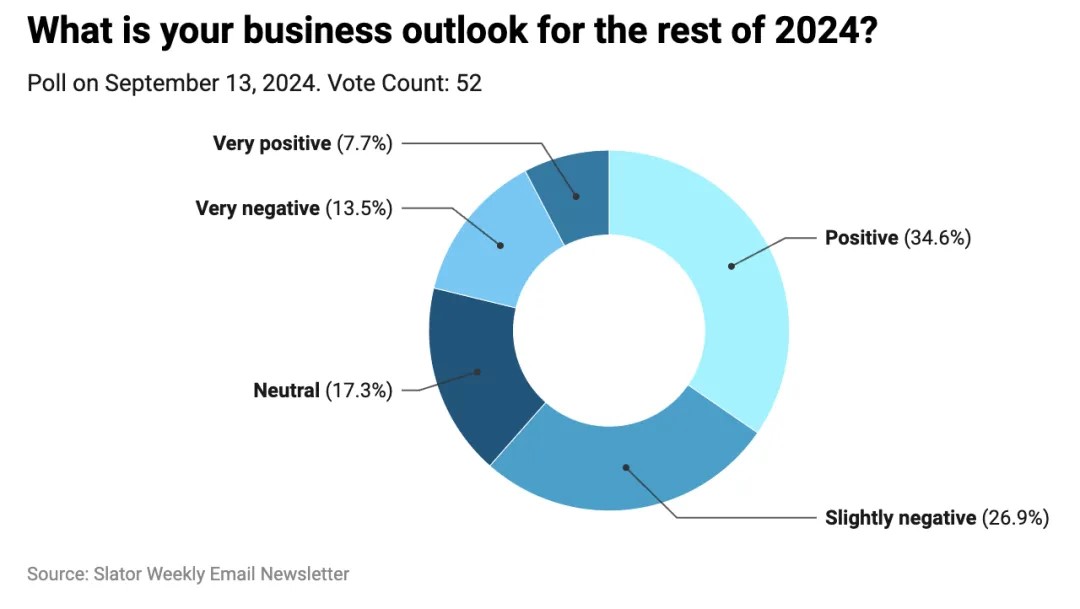人工智能是否“彻底改变”了语言专业人员的日常工作?
2024年10月31日 10:00 天津
Has AI ‘Radically Changed’ Day-to-Day Work of Language Professionals?

( 图片来自Slator官网 )
Lilt CEO Spence Green’s observation on SlatorPod that localization has become one of the key use cases to show return on investment in AI is something most people in the industry can agree with. And when some big names like Reddit not only make AI-enabled localization part of their growth strategy, but also make good on their intent, as they announced in September 2024, the skeptics ought to notice, too.
Lilt首席执行官斯彭斯-格林(Spence Green)在SlatorPod上指出,本地化已成为人工智能投资回报的重要案例之一,得到了业内大多数人的赞同。像Reddit这样的大公司不仅将人工智能本地化作为其发展战略的一部分,而且正如他们在2024年9月宣布的那样,他们很好地实现了自己的规划。此时,应当有一些值得思考的地方。
The technology is certainly there for all who wish to open the door to automation of multiple localization tasks.
对于所有希望实现各种任务自动化的本地化从业者来说,技术无疑是绕不开的一环。
Transformed content workflows and customization of target outputs via trained/fine-tuned large language models (LLMs) are just two examples of what can now be done. But there is a lot more.
目前仅能做到的两个场景是,通过训练/微调的大型语言模型(LLMs)转变内容工作流程和定制目标产出。但是,可以做的还有很多。
What retrieval-augmented generation (RAG) and AI orchestration can help accomplish, and the ability to process ultra-mega-massive volumes of content using AI, are also great ways to boost that precious ROI… even automating quality assurance to different degrees based on the type of content.
比如,借助检索增强生成(RAG)技术和人工智能协调实现目标,以及利用人工智能的能力处理超大内容,也能提高宝贵的投资回报率,甚至根据类型在不同程度上自动保证内容质量也是其中之一。
Still, quality assurance remains one of those subjects for experimentation and debate. For that and much more, it is humans who need to get their heads around retooling processes, roles, and the back office so that no new problems are unnecessarily created as AI is implemented.
尽管如此,质量保证仍然是需要试验和讨论的主题之一。为此,人们需要绞尽脑汁,对流程、角色和后台进行重新调整,以规避在使用人工智能时产生不必要的新问题。
We asked readers if AI (LLMs included) has changed their day-to-day work in the past 24 months. Over a third of respondents (37.5%) said that has not happened at all (!). A little less than a quarter (23.6%) are on the opposite end of the spectrum saying it has done so radically. The rest, two equal groups (19.4% each respectively), said it has somewhat changed it or just a bit.
我们对读者进行了采访,询问人工智能(包括大语言模型)在过去两年中是否改变了他们的日常工作。超过三成的受访者(37.5%)表示完全没有(!)。略低于四分之一(23.6%)的受访者则持相反意见,认为有翻天覆地的变化。其余两组(各占 19.4%)认为有一些改变或仅改变了一点。

✦
•
✦
Benched or Still in The Game?
退场还是继续?
“Bouleversement” is a French word that perfectly describes the sort of situation some in the language industry are facing as it evolves toward increased AI automation: beyond upset or disruption, more like an upheaval.
法语单词“Bouleversement”完美地描述了一些语言行业工作者在人工智能自动化程度不断提高的过程中所面临的情况:(人工智能带来的)既不是混乱也不是破坏,更像是一场动荡。
Back in March 2024, readers could already feel upheaval and pressure increasing as they answered polls on bankruptcies, the relevance of language service provider offerings, and individual use of AI. Two quarters later, the upheaval appears to gain momentum.
早在2024年3月,读者在回答有关破产、语言服务提供商产品的相关性以及个人使用人工智能的投票时,就已经感受到了动荡和压力持续增加。两个季度后,这种势头似乎有所增强。
The market will continue to change. More translators will become AI training and QA experts, and more project managers will become a combination of AI process designers and sentries. Regardless of role, most in the industry are likely feeling the pressure, with generalist language service providers (LSPs) and linguists facing tough choices.
市场依旧持续变化。越来越多的译员将成为人工智能训练和质量专家,越来越多的项目经理也将成为人工智能流程设计和监测专家(同时承担人工智能流程设计和监测的职责)。但无论角色如何,大多数业内人士可能都感受到了压力,即通用语言服务提供商(LSP)和语言学家面临着艰难的抉择。
We asked readers how the talent situation is in this environment in their corner of the language industry, and half (50.0%) responded that there is an oversupply, and the talent situation is super competitive.
我们向读者询问了在这种环境下他们所在的语言行业领域的人才供需状况,半数(50.0%)读者回答说供过于求,人才竞争异常激烈。
Interestingly, a third of respondents actually face a talent shortage (30.0%). For the rest (20.0%), the talent situation is balanced.
有趣的是,三分之一的受访者实际上面临人才短缺问题(30.0%)。剩下的读者(20.0%)则认为,人才供需是平衡的。

✦
•
✦
Practical and Tactical AI Adoption
实用与战术性人工智能应用
At SlatorCon Silicon Valley in September 2024, the growing level of confidence in generative AI and large language models (LLMs) in localization at the enterprise became quite clear.
在2024年9月举行的硅谷SlatorCon会议上,企业在本地化中应用生成式人工智能和大型语言模型(LLM)所抱有的信心愈加明显。
Slator research featured 20 practical applications of large language models (LLMs) in translation and localization. And Hameed Afssari, Uber’s Head of Globalization, commented later in a conference panel that Uber has “tested or implemented 12 out of the 20 already.”
Slator研究了大型语言模型 (LLM) 在翻译和本地化方面的20项实际应用。Uber全球化负责人哈米德-阿夫萨里(Hameed Afssari)随后在会议小组讨论中评论说,Uber“已经测试或实施了20项中的12项”。
It is not uncommon now to find an equal measure of scientific research on LLMs and language and language technology companies leveraging them for features and functionality on localization products and services, and Uber is but one example.
现在,有关语言和大语言模型的等量科学研究以及语言技术公司利用大语言模型为本地化产品和服务增添特色和功能的情况并不少见,Uber就是其中之一。
Small, medium, and large companies, as well as freelancers, and just about everyone with a job in the industry, have been exposed to LLMs in one way or another.
无论是大中小型公司,还是自由职业者,几乎所有在该行业工作的人都或多或少地接触过大语言模型。
We asked readers how they would describe their company’s level of LLM adoption, and close to a quarter (24.5%) is in the awareness phase. Two groups of respondents (20.4% each) are either still in the discovery stage or actively using LLMs.
我们请读者描述其公司运用大语言模型的程度,结果发现有近四分之一(24.5%)的公司处于认识阶段。有两组受访者(各占20.4%)认为(公司)或仍处于探索阶段,或正在积极使用大语言模型。
The rest of the respondents said their level of adoption is inactive (16.3%), operational (10.2%) or systemic (8.2%).
其余的受访者表示,他们的运用程度是非活跃(占16.3%)、使用(占10.2%)或系统性使用(占8.2%)。

✦
•
✦
Winding Down or Ramping Up?
收尾还是加速?
Something else that was discussed in the rooms and halls at SlatorCon Silicon Valley in September 2024 was the featurization of AI translation in many products (where translation did not exist before).
会议上,与会者还讨论了人工智能翻译的特征(之前未曾讨论过)。
There are several cases. Adobe offering AI in beta mode dubbing and lip-syncing API and Asana revealing “AI Teammates” as a tool in the management platform to write, translate, update, and even answer questions, are two of them. Both are on the localization buyer side and what this means for the host of localization vendors that can be impacted by such internal featurization at large tech companies and elsewhere is speculative at the time this article is written.
众多案例中有两项是,Adobe在测试模式中提供人工智能配音和唇语API,Asana在管理平台中推出 “人工智能伙伴”工具,用于撰写、翻译、更新甚至回答问题。这两家公司都是本地化服务的买方。本文对大型科技公司和其他公司的这种将本地化内部化可能对大量本地化供应商产生的影响尚无定论。
Whatever the level of speculation and uncertainty, with ChatGPT now an old mate at almost three years old, surely language access businesses have a different outlook for Q4 2024 than they did a year ago.
无论猜测和不确定性有多大,随着ChatGPT近三年的发展,语言接入企业对2024年第四季度的展望肯定与一年前有所不同。
We asked readers what their business outlook is for the rest of 2024, and over a third (34.6%) said it is positive. For a little over a quarter (26.9%) of respondents, things are looking slightly negative. For one in every six respondents (17.3%), the horizon is neutral. For the rest, the outlook is either very negative (13.5%) or very positive (7.7%).
我们询问了读者对2024年余下时间的业务展望,超过三成(34.6%)表示积极乐观。两成多(26.9%)认为情况略显消极。每六个受访者中就有一人(17.3%)对前景持中立态度。其余受访者中,要么非常消极(13.5%),要么非常积极(7.7%)。

特别说明:本文内容选自Slator官网,仅供学习交流使用,如有侵权请后台联系小编删除。
添加助教

– END –
摘译编辑:钱彦丰
指导老师:周原
项目统筹:武娇阳
▶ 国际翻译动态 | 翻译公司篇 | “收购狂魔”Keywords Studios
欢迎大家点赞关注,支持我们~
- 内容低质
- 不看此公众号内容
-
hhh 上海13小时前
一切才开始。ai的进化也才开始。

